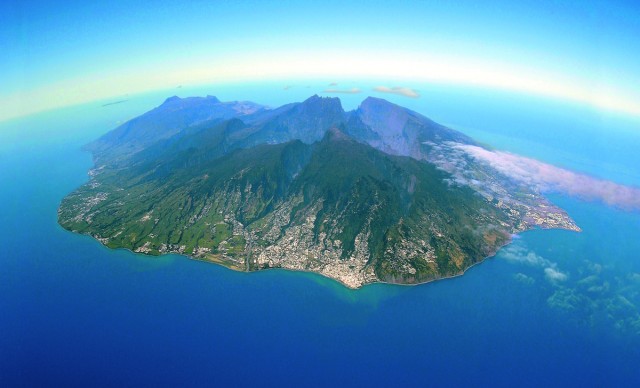Reunion
Reunion, a small island lying about 500 miles east of MADAGASCAR, is ruled as an overseas territory of France. Along with the islands of MAURITIUS and Rodrigues, it forms a region of great natural beauty known as the Mascarene Archipelago.
Land and Peoples
Despite its small size, Reunion has a diverse geography. Three peaks of over 9,000 feet form wide valleys drained by several rivers. The southern and eastern portions of the island receive up to 300 inches of rain per year, while the north and west receive only about 25 inches. The climate is tropical in low-lying regions and much cooler and drier in the mountains. Forests cover one-third of the country.
Arriving in the early 1600s, the French were the first people to live on Reunion. Dutch, Italian, English, and African settlers soon joined them. The Europeans imported slaves from India and Africa until the practice was outlawed in the mid-1800s. Later, they brought indentured laborers from Asia and Africa. The island's current population is mostly descended from African slaves who intermarried with other groups. Most citizens are Catholics and speak both creole and French, the nation's official language.

History, Government, and Economy
In the 1700s the French used the island, then called Ile de Bourbon, as a naval base from which to attack India. After the French Revolution, the island's name was changed to Reunion and a colonial assembly was created. However, French emperor Napoleon Bonaparte soon restored royal control of the island's government. Britain seized the island during the Anglo-French War of the early 1800s but returned it to France after Napoleon was defeated in 1814. In 1848 France abolished slavery and gave colonial subjects the right to elect deputies to the National Assembly.
Since 1946, Reunion has been an overseas territory of France with its own elected assembly. France provides welfare payments and other forms of social relief to many islanders. However, these benefits are less than those paid to French citizens in France, and islanders have sometimes protested this unequal treatment with demonstrations, strikes, and riots.
Sugarcane dominates Reunion's economy, with almost 70 percent of the arable land dedicated to sugar cultivation. This is still true even though old laws regarding land use, aging plants, droughts, and tropical storms have greatly reduced the sugarcane output on the island. The sugarcane trade is dominated by 10 sugar estates that are controlled by roughly five large sugar companies. Smaller sugar planters used to play an active role in the economy, but the high cost of buying mechanized equipment and the rising prices charged for imported fertilizers drove out all but the largest companies. Other important crops include vanilla and various plants used in making perfumes. Declining sugar prices and high unemployment have led to widespread poverty. The government has taken steps to diversify the economy, with limited success. The tourism industry also brings revenue to Reunion, which is a popular vacation spot. (See also Colonialism in Africa.)